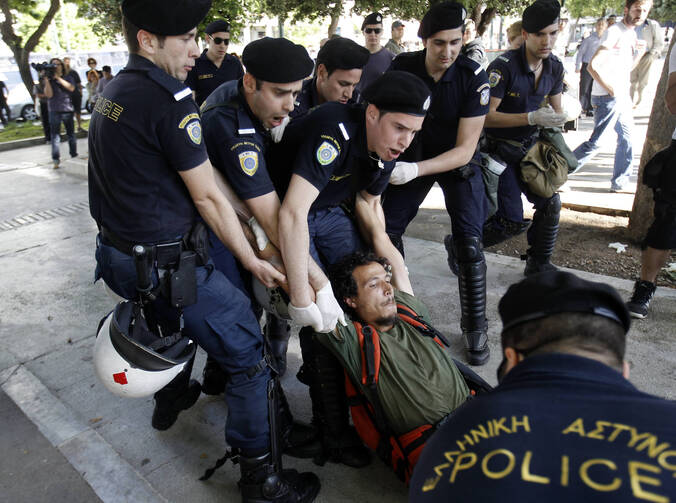A Greek Catholic leader welcomed his country's new anti-austerity government and predicted Catholics would benefit from changes.
"Although the interests and concerns of churches like ours will be secondary for the new government, I think we can be optimistic our possibilities will improve," said Archbishop Nikolaos Printezis, general secretary of Greece's six-member bishops' conference.
"This is something very new in our country's history—we must be patient in seeing the results," he said on Jan. 28.
Archbishop Printezis said he thought the government elected Jan. 25 would find it hard to work with Greece's foreign economic partners. However, he added that the atmosphere looked set to improve for most citizens and said the new coalition also appeared determined to treat religious minorities with greater "openness and equality."
"Up to now, there's been a very obvious division between Orthodox citizens and those of other faiths—if you were Orthodox, all was well, but if you were Catholic or Protestant, it wasn't," said Archbishop Printezis.
"All minorities have faced hardships from the side of the state. But the new government looks ready to take responsibility for the whole Greek people rather than just serving its own interests," he said.
The same day, Greece's new governing coalition held its first meeting in Athens under Prime Minister Alexis Tsipras, whose Syriza party won the elections on a pledge to ditch austerity policies and renegotiate the country's huge European Union and International Monetary Fund bailout.
Greek newspapers predicted the new prime minister would move to loosen traditional state links with the predominant Orthodox Church, which claims the spiritual loyalty of 97 percent of the country's 11 million inhabitants.
Besides renegotiating Greece's $271 billion bailout, the Tsipras government has promised to boost the minimum wage and create 300,000 new jobs, especially for people under 25, among whom unemployment stands at 50 percent.
However, Jean-Claude Juncker, president of the European Commission, warned on Jan. 27 that Greece could not expect a reduction of its debt commitments. Steffen Seibert, German government spokesman, also urged Greece to maintain its five-year program of spending cuts, which have included school closures, sweeping privatization and state-sector wage reductions.
Archbishop Printezis told CNS a "change of mentalities" was needed, and Greek voters were no longer prepared to "follow EU orders and directives."
"This government has come up solutions and recipes for change, and I'm optimistic things will go well now," he said.
Mostly foreign Catholics make up just 3 percent of the population of Greece, whose constitution, amended in 2008, declares Orthodoxy the ''prevailing religion," prohibits Bible translations without Orthodox consent and requires public office-holders and court plaintiffs to take a religious oath.
In 2006, the Greek Parliament voted to review the official status of the Orthodox Church, and last October Catholics, Protestants, Copts and other denominations gained greater legal autonomy under a new law, the first on religious minorities for 68 years.
However, in his interview, Archbishop Printezis said the Catholic church's six dioceses and archdioceses were still being denied "official acceptance."
He added that the Greek state paid the salaries of Orthodox clergy but offered nothing to Catholics. He also said Orthodox bishops shunned contacts with Christian minorities, insisting "their faithful would object."
"The Orthodox church forms the great majority here and should cooperate with the state for the good of humanity -- but not at the expense of other churches," the archbishop told CNS. "I think things will be different now, as steps are taken to make church and state independent of each other in their respective spheres."








